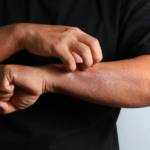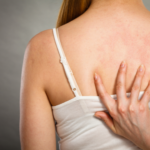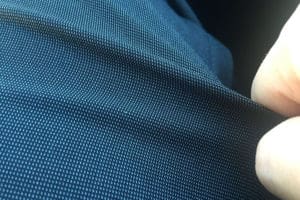Bananas are high in potassium and many other vitamins and minerals. But many people claim bananas cause their eczema to flare up or lead to eczema symptoms.
Do bananas flare up eczema? Bananas can flare up eczema if you have a banana allergy, a banana intolerance, or if you consume under-ripe bananas that are hard to digest. An elimination diet is an effective method to determine if bananas cause your eczema to flare up.
Read on to learn more about whether bananas flare up eczema, as well as the benefits of bananas.
Are Bananas Good for Eczema? What Are the Banana Benefits?

Bananas are widely consumed around the world. They are grown in over 100 countries and are ranked fourth in monetary value among the world’s food crops. Americans consume more bananas than all oranges and apples combined. It’s easy to see why they are so popular due to their many benefits.
They are easy to add to your diet, being one of the most affordable and convenient snack foods available. Their peel is like nature’s own packaging; you can take it to go with ease… just peel and eat!
They often do not contain harsh pesticides that you have to wash off because of their protective peel, unlike exposed fruits such as apples and grapes. They are also very easy to add to smoothies, cereal, or yogurt, or even as a sugar substitute in baking.
Bananas are high in potassium. One medium-sized banana contains about 400 milligrams of potassium. Potassium is an important mineral for our body as it regulates the transportation of nutrients to and from our cells.
It also helps our muscles contract, allows our nerve cells to respond, keeps the heart beating steadily, and can reduce blood pressure. Potassium can also reduce the risk of kidney stones which can form as we get older.
One medium-sized banana (about 120 grams) only has about 100 calories and is made up almost entirely of water and carbs, with very little protein and almost zero fat. One banana also contains a good amount of fiber, several antioxidants, and a variety of other vitamins and minerals.
One medium banana has the following:
- Vitamin B6: 33% of the RDI
- Manganese: 14% of the RDI
- Vitamin C: 11% of the RDI
- Copper: 10% of the RDI
- Potassium: 9% of the RDI
- Magnesium: 8% of the RDI
- Net carbs: 24 grams
- Fiber: 3.1 grams
- Protein: 1.3 grams
- Fat: 0.4 grams
These vitamins and nutrients are critical for maintaining healthy, eczema-free skin. If you suffer from eczema, you may be lacking in important vitamins. Bananas can help top up what is lacking and therefore keep your skin calm and minimize flare-ups.
Vitamin C is especially useful for avoiding eczema flare-ups. If bananas are so beneficial, why is it that so many people report that they cause issues for their skin? In the next section, I’ll discuss how bananas can flare up eczema.
Also, for an excellent moisturizer, take a look at our top pick, the Malin + Goetz Vitamin E Face Moisturizer:
Click here to see it on Amazon.
How Do Bananas Flare Up Eczema?
Bananas may be very healthy for many, but there are many that have problems with them. If you’ve eaten banana recently and noticed soon after an eczema flare-up, you may be wondering how could such a major health food like bananas have caused your skin to get worse?
Bananas can flare up your eczema, making it worse if you have a banana allergy, banana intolerance, or if you consume unripe bananas.
Banana Allergy
Despite all the good bananas have, they certainly could flare up your eczema or cause other problems if you have a banana allergy.
The estimated number of Americans who are allergic to bananas ranges from 0.5 to 1% of the population. Skin itching and rashes, including eczema, can develop after eating or even just after touching the fruit or peel.
It is thought that banana allergy is caused not just by the fruit but by an allergy to a protein in the fruit called chitinase. This protein is also found in avocado and kiwi, so if you have a banana allergy, you may react to these other two fruits.
What’s more is that around 45% of those who suffer from latex allergies are also allergic to bananas. This similarity is due to naturally occurring levels of chitinase in the rubber tree sap, which is used to make latex products.
Symptoms of a banana allergy include more than just eczema, but also can include itchy mouth and throat, itchy feet or ankles, swelling of the lips, tongue, cramps, diarrhea, trouble breathing, vomiting, hives, and anaphylactic shock in more serious cases.
If you suspect you have a banana allergy, you should see a doctor to get confirmation. Your doctor will ask you detailed questions about your history, including all signs and symptoms you have experienced.
This will help your doctor determine if the allergy runs in your family and is causing your symptoms. Your doctor should also recommend a skin prick test or patch test. These tests involve exposing your skin to a variety of extracts or substances that could cause dermatitis or eczema.
If the banana is a suspect, then that will be included along with many other common allergens such as soy, corn, wheat, latex, fragrances, hair dyes, metals, resins, preservatives, and medications.
If your allergy test turned up negative for bananas, you might not be allergic to them, but you could still have a banana intolerance.
To see how long skin allergies last, see my post: How Long Does Skin Allergy Last?
Banana Intolerance
Unlike a banana allergy, if you have a banana intolerance, symptoms often don’t occur right away. Sometimes symptoms can take several days to appear, which means it can be difficult to determine if it is the banana or something else that was the cause.
Food intolerances occur when the body mistakes the proteins in food as a foreign entity. Often this happens when small particles of the food leak through the gut lining into the bloodstream.
The body then sends antibodies to attack the particles as they see it as a threat. These antibodies lead to an inflammatory response which causes eczema and other issues.
The degree of symptoms for those with banana intolerance can vary from mild discomfort to more severe. These symptoms can include bloating, stomach cramps or pain, excessive gas, headaches, diarrhea, and rashes such as eczema and psoriasis.
Unripe Bananas

Bananas grow in tropical regions and are harvested while still green so that they can ripen as they are shipped around the world. Some people prefer the less ripe, green bananas over the more ripe, yellow bananas.
It is safe to eat green bananas, but there are different digestive and nutritional differences between them and yellow bananas. Green bananas will also taste more bitter and have a waxy feel compared to yellow bananas.
As bananas ripen, their starch gets broken down into small, simple carbohydrates that taste sweeter and are easier to digest. But this can be a problem for anyone limiting their intake of sugar or simple carbs.
While they are green, bananas have something called resistant starch. This resistant starch resists getting broken down in the intestine and gives a number of benefits. It releases satiety hormones which makes you feel fuller for longer. It also can help reduce the risk of heart disease and type-2 diabetes.
The problem with green bananas is that they do not digest as easily as yellow bananas. This can lead some to experience discomfort, bloating, or constipation after consuming them.
As atopic dermatitis (eczema) is so directly related to a healthy gut and intestinal tract, avoid unripe, green bananas. You can also test with a small amount of the green banana at first to notice if you experience any reaction to them.
I was born with atopic dermatitis for much of my life and have found bananas do tend to flare up my eczema. I find that shortly after eating bananas, I develop eczema symptoms like patches of itchy skin that might turn into red skin.
This seems to be an issue for many other eczema sufferers who I have known.
It May Not Be the Banana, but Rather Leaky Gut
It might not be the banana that is flaring up your eczema; the bigger issue might be that you have a leaky gut.
Eczema has many causes and comes in many forms, most commonly a red, itchy rash known as atopic dermatitis. According to conventional medicine, the cause of eczema is mostly unknown, but more and more, it is becoming accepted as a symptom of an abnormal autoimmune system.
Eczema occurs when your immune system is so stressed by threats it perceives that it goes into overdrive and attacks your skin. The same can be said for asthma and seasonal allergies and eczema symptoms often experienced by eczema sufferers.
Increasingly, the concept of “leaky gut” is said, by alternative and holistic practitioners, as being a leading cause for this dysfunctional autoimmune system.
What is going on in your gut has a big effect on your immune system and overall health. 80% of your immune system is in your gut, which means it is critical to keep it in top shape. A poorly functioning intestinal tract is one of the major causes of autoimmune diseases, including eczema. (source)
A healthy GI tract acts as a barrier preventing undigested food particles, toxins, microbes, and other unwanted substances from getting into the bloodstream.
When the cells which line the walls of your intestine become damaged, these substances leak through the walls into the body and are attacked by the immune system, which leads to inflammation.
This inflammatory response, which is triggered by an overactive immune system, shows its effects in the form of eczema and many other symptoms.
This gut inflammation, which is caused by leaky gut, decreases the protective function of your skin, which increases the inflammation and makes the symptoms worse.
Try an Elimination Diet to Determine If Bananas Cause Your Eczema
An elimination diet is always a good idea for answering determining trigger foods to avoid. Simply eliminate bananas for a period of time, and assess if your skin has improved.
Then reintroduce bananas gradually and assess if your skin or eczema worsens. Solving eczema problems is not simple, but over time, with patient trial and error, you will see improvement.
Eliminate bananas altogether from your diet for 2 to 3 weeks. It’s also best to eliminate other common trigger foods such a dairy, nuts, corn, soy, citrus fruits, gluten, eggs, pork, and seafood.
During this time, determine if your symptoms improve. If your symptoms still remain after 2 to 3 weeks, then it is best to notify your doctor.
After the 2 to 3 weeks, slowly reintroduce each food individually, over 2 to 3 days. Start with banana for 2 to 3 days. Then the next food for 2 to 3 days, and so on.
Determine if your eczema flares up or any other symptoms such as joint pain, fatigue, bloating, cramps, trouble sleeping, or headaches. If your eczema flares up or you get other issues after reintroducing a food, then you have identified a trigger food, and it should be removed from your diet.
Conclusion – Do Bananas Flare Up Eczema?
So to revisit the question, do bananas flare up eczema? Bananas have many benefits that make them good for eczema. They can flare up eczema if you have a banana allergy, a banana intolerance, or if you eat bananas that aren’t ripe.
To determine if bananas are causing your eczema to flare, try an elimination diet. An elimination diet is very effective at narrowing down culprit foods.
It can be very beneficial to visit a doctor who can give you an allergy test to see if you have a banana allergy or intolerance. A doctor can also help coach you through a proper elimination diet.
I know how hard it can be to learn that certain foods you once loved can cause issues for your eczema. But the benefit of being eczema-free far outweighs the taste of that food.








